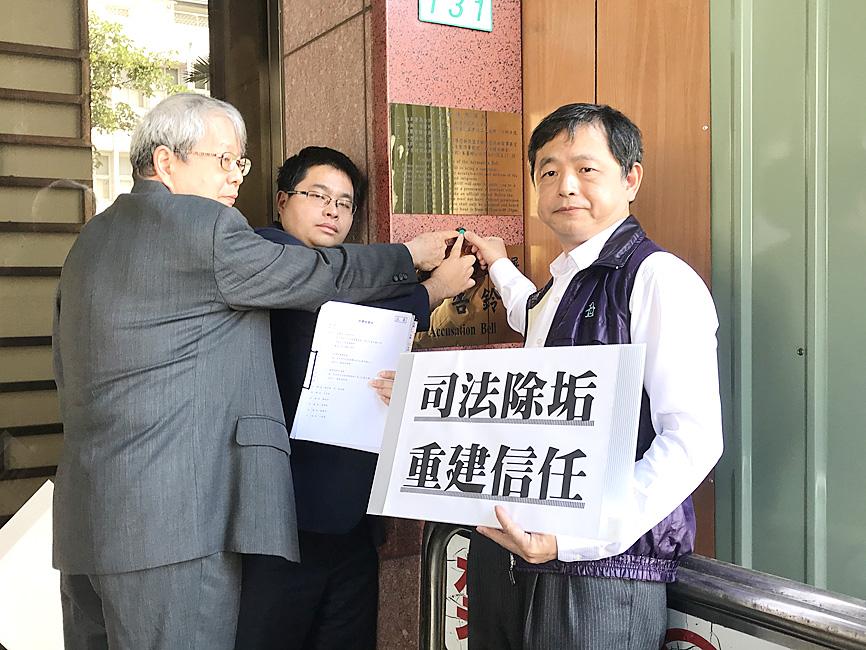The investigation into the Weng Mao-chung (翁茂鍾) case would hold all judicial personnel involved accountable to the strictest interpretation of the law, Judicial Yuan President Hsu Tzong-li (許宗力) said yesterday, while pledging more action against misconduct to uphold the judiciary’s credibility.
Hsu pledged to investigate the few judges who might be contravening laws to protect the work of honest judges and uphold the dignity of the judiciary.
Weng, president of Chia Her Industrial Co (佳和), is accused of bribing 40 to 50 judicial workers, judges and prosecutors to obtain non-guilty or lighter sentences in four criminal cases.

Photo: CNA
Weng allegedly gave them shirts and arranged expensive banquets for them.
Weng’s actions came to light after the Control Yuan passed a motion to impeach Weng’s friend, former Commission on the Disciplinary Sanctions of Functionaries secretary-general Shih Mu-chin (石木欽), for allegedly breaching the Judges Act (法官法).
Shih, who until 2017 served as a Supreme Court judge, did not recuse himself from cases involving Weng and allegedly provided Weng with legal advice, investigators from the Judicial Yuan and Ministry of Justice said.
The ministry’s Human Resource Review Committee yesterday said that 26 judges should be punished for their involvement in the case, but only Supreme Administrative Court Judge Cheng Hsiao-kang (鄭小康) is suspected of breaching Article 51 of the Judges Act (法官法), and his case has been forwarded to the Control Yuan.
The committee said that the other 25 judges could not be punished due to the statute of limitations.
Cheng is the eighth judge whose case has been forwarded to the Control Yuan.
The other judges, who are not among the 25, include former judges Lin Chi-fu (林奇福), Yen Nan-chuan (顏南全), Su Yi-chou (蘇義洲), Tseng Ping-shan (曾平杉), Chen Yi-chung (陳義仲) and Lin Chin-tsun (林金村).
They were named in an investigative report released on Jan. 18, while Cheng and the other 25 judges were named in an investigative report released yesterday.
Three former grand justices were investigated by the Council of Grand Justices Disciplinary Committee and found innocent, the ministry said.
The committee cleared 23 judicial workers and prosecutors of wrongdoing due to a lack of documentation or credible evidence, or because their actions were within the parameters of normal social interaction.
Minister of Justice Tsai Ching-hsiang (蔡清祥) at 6pm yesterday held a news conference stating that four prosecutor-generals and 10 prosecutors are also under suspicion, and they are being investigated.
Former minister of justice Tseng Yung-fu (曾勇夫), who at the time being investigated was serving as chief prosecutor at the Taiwan High Prosecutor’s Office, is suspected of having accepted gifts and attended multiple banquets held by Weng, and is being investigated, Tsai said.
The Legislative Yuan’s Judiciary and Organic Laws and Statutes Committee, which on March 11 convened a panel to investigate the case, yesterday said that it would, from today, begin discussing what documents to look into.
The panel said it would focus on the administrative investigations conducted and invite agencies to attend panel meetings.

A Ministry of Foreign Affairs official yesterday said that a delegation that visited China for an APEC meeting did not receive any kind of treatment that downgraded Taiwan’s sovereignty. Department of International Organizations Director-General Jonathan Sun (孫儉元) said that he and a group of ministry officials visited Shenzhen, China, to attend the APEC Informal Senior Officials’ Meeting last month. The trip went “smoothly and safely” for all Taiwanese delegates, as the Chinese side arranged the trip in accordance with long-standing practices, Sun said at the ministry’s weekly briefing. The Taiwanese group did not encounter any political suppression, he said. Sun made the remarks when

PREPAREDNESS: Given the difficulty of importing ammunition during wartime, the Ministry of National Defense said it would prioritize ‘coproduction’ partnerships A newly formed unit of the Marine Corps tasked with land-based security operations has recently replaced its aging, domestically produced rifles with more advanced, US-made M4A1 rifles, a source said yesterday. The unnamed source familiar with the matter said the First Security Battalion of the Marine Corps’ Air Defense and Base Guard Group has replaced its older T65K2 rifles, which have been in service since the late 1980s, with the newly received M4A1s. The source did not say exactly when the upgrade took place or how many M4A1s were issued to the battalion. The confirmation came after Chinese-language media reported

The Taiwanese passport ranked 33rd in a global listing of passports by convenience this month, rising three places from last month’s ranking, but matching its position in January last year. The Henley Passport Index, an international ranking of passports by the number of designations its holder can travel to without a visa, showed that the Taiwan passport enables holders to travel to 139 countries and territories without a visa. Singapore’s passport was ranked the most powerful with visa-free access to 192 destinations out of 227, according to the index published on Tuesday by UK-based migration investment consultancy firm Henley and Partners. Japan’s and

BROAD AGREEMENT: The two are nearing a trade deal to reduce Taiwan’s tariff to 15% and a commitment for TSMC to build five more fabs, a ‘New York Times’ report said Taiwan and the US have reached a broad consensus on a trade deal, the Executive Yuan’s Office of Trade Negotiations said yesterday, after a report said that Washington is set to reduce Taiwan’s tariff rate to 15 percent. The New York Times on Monday reported that the two nations are nearing a trade deal to reduce Taiwan’s tariff rate to 15 percent and commit Taiwan Semiconductor Manufacturing Co (TSMC, 台積電) to building at least five more facilities in the US. “The agreement, which has been under negotiation for months, is being legally scrubbed and could be announced this month,” the paper said,